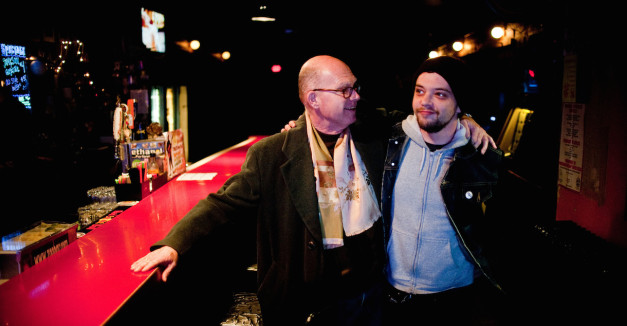story by Jacob Zlomke | photos by Andrew Dickinson
Saber Blazek walks into the Zoo Bar in downtown Lincoln. He’s sweating and breathing heavily from a vigorous bicycle commute. Outside, wind gusts and snowflakes begin to fall on the first truly cold day of the season.
As soon as he opens the poster-covered door, the woman behind the bar points her hands in the shape of guns at him: “Pew, pew!”
She’s shot him, and apparently, it’s not the first time she’s bested Saber in a duel.
The two laugh and exchange small talk. Saber sarcastically remarks on the day’s heat, and the bartender asks him if he wants a Ranger IPA, to which he nods.
35 years earlier, Saber’s father, Steve, sat on these barstools and chatted with the bartenders. Steve’s picture hangs on the wall of the 50-year-old blues bar, alongside dozens of other local and touring musicians who have played the small stage over the last few decades.
Saber guesses his dad must have been in his early 20s when the photo was snapped. Steve’s playing guitar, but it’s anyone’s guess as to exactly when or with whom.
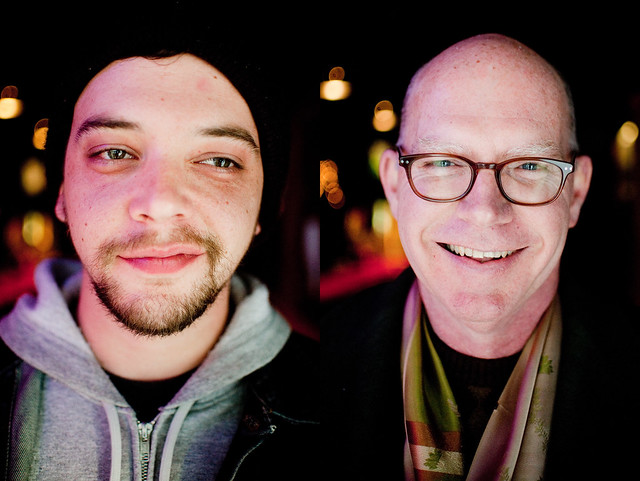
“It’s funny when you look at these old schedules,” Steve says from behind the counter at Bin 105, the specialty wine store he operates. “I was playing there four or five nights a week.”
In the last six years, Saber has played that same stage as the bassist for now defunct prog-rock band The Machete Archive and with his current project Halfwit.
For 20 years, Steve worked as musician in Lincoln and Nashville, where Saber and his younger brother, Emory, were born. Saber’s grandfather studied at Juilliard and played tenor saxophone with Les Brown and His Band of Renown. His great grandfather played in the Lincoln Symphony.
Steve recalls his father’s childhood as one with high standards and rigorous practice.
“He grew up very poor, and it was just expected of him to be a musician,” he says. “They forced him to practice, hour after hour after hour. In turn, he became a really great musician, but it made him have a softer attitude with me. He got turned off to that style by his parents.”
His father pushed Steve toward music, but with a more relaxed approach. He had the freedom to choose his own instrument. At 10, he began playing drums, but quickly became entranced with guitars, especially the pedal steel, through exposure to folk music by his childhood friend Chris Sayre.
“I noticed how Chris was getting all the girls, doing that singer/songwriter stuff, and I had to carry all this stuff around,” Steve says with a smile. “So I thought I’ll get a guitar instead.”
His infatuation with the pedal steel drew Steve to country music, which eventually led to his career in Nashville.
“In high school, I had this long hair but was listening to George Jones, and people couldn’t really figure out what was going on.”
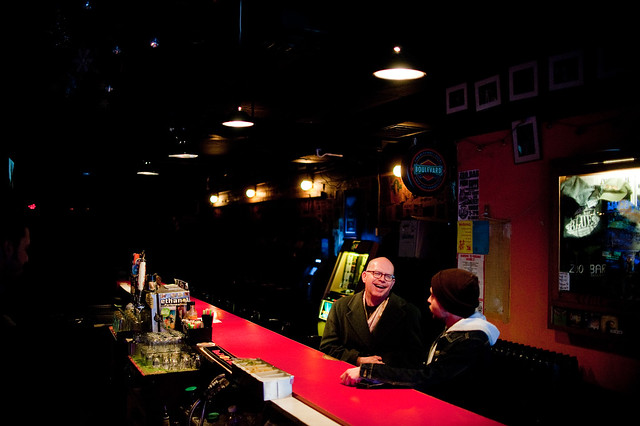
In Nashville, Steve played with minor acts locally and some national acts, and worked as a recording musician.
“Most of the people down there are pretty established family guys,” Steve says. “Everybody could play, so it wasn’t so much your talent but your ability to get along and fit in. Having a family and hanging around with other guys with families made it easy to relate.”
For Saber, that meant an early life filled with his father’s musician friends.
According to Steve, Saber grew up around musicians’ children, including Mark O’Connor’s son, who Steve calls “one of the greatest fiddle and mandolin players alive.”
Saber remembers his dad’s friends from a young age.
“I was surrounded by musicians whenever we went out,” Saber says. “My dad’s the kind of guy who knows everybody. Even coming back here, he knows all sorts of people. That was kind of weird growing up, like, ‘Who’s this person, how do you know this person?’ Oh you play music, that makes sense that you make those connections. That’s kind of the whole idea — getting people together.”
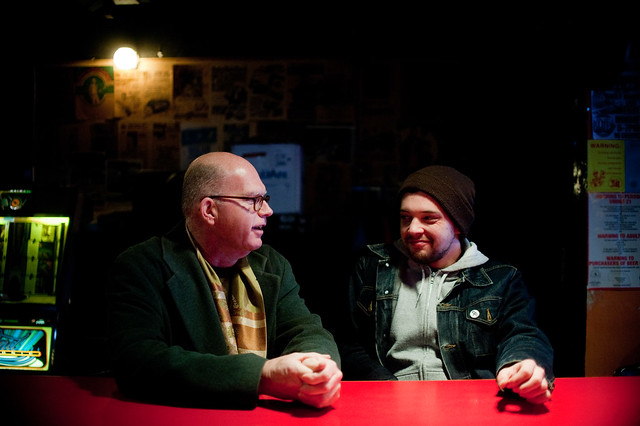
When Saber was 6, the Blazeks moved from Nashville back to Lincoln. Steve says he wanted to pursue other things. He now owns and operates Bin 105 in Lincoln’s Haymarket. Saber recently finished remodeling the store’s new location.
Steve doesn’t play much music anymore. Too busy with the store, he jokingly refers to himself as an old man. People used to ask Saber if he’s Fuzzy’s kid (Steve is known as Fuzzy in music circles). Lately, Steve gets asked if he’s Saber’s dad instead. Times change, one Blazek steps out of the scene and leaves space for another.
Steve speaks about music as though it’s a part of his past and doesn’t seem overly nostalgic. He regards musicianship as merely a phase of life, like four years at a university. Yet the acoustic guitar and record player that sit next to a chair behind Bin 105’s counter belie his casual attitude toward the art that may very well have defined his life — he did, after all, meet his wife, Regina, Saber’s mother, in Nashville.
Even more, a return to Lincoln didn’t mean an exodus from music for the young Blazek boys.
“I never pushed my kids toward sports because I’ve never been very sports-minded,” Steve says, “so I thought some structure like (music) would be good.”
When he was 9, Saber began playing alto saxophone in his school band. He stuck with it for five years, but found it unfulfilling.
“It’s a fun instrument, but playing orchestra music all the time gets really boring,” he says. “You have to do it with a large group of people to make a song, and you’re second chair, third part and you just sit there and play a few lines for an hour a day.”
When Saber told his dad he no longer wanted to play saxophone, Steve was OK with it on the condition that the 14-year-old Saber pick a different instrument to pursue.
“I went downstairs that night and there was this VH1 Behind the Music thing with Red Hot Chili Peppers, and I watched Flea do his thing. It was just like, ‘Oh, that’s what I want to do. I’ll do that.’ So I went upstairs and told my dad I wanted to play bass.”
While Saber still has his saxophone, and has since learned to play guitar, drums, keyboards and other instruments, none have resonated with him in the same way as the bass guitar.When speaking about playing bass, Saber drifts away from the present moment. His eyes look toward the selection of liquor behind the bar, but his mind is registering something else.
“I don’t know why I prefer bass. I love the way it feels to play it.”
A thoughtful pause.
“It’s amazing.”
Both Saber and Steve were surprised at how strongly he took to the instrument. Steve recalls days when Saber would be locked in his room listening to the Red Hot Chili Peppers. He remembers the sense of pleasant surprise when Saber began writing his own songs. Like his father, Saber began playing in bands during high school, most of which he says maybe played one show and then fizzled out.
While going to pop punk shows around Lincoln in his teens, Saber was exposed to bands further off the beaten path, further from pop punk’s predictable three-chord arrangements. He met people with similar musical interests at shows with Her Flyaway Manner and Mr. 1986, Lincoln bands that helped him to see music differently.
“To see this raw emotion really talked to me. It was like, yeah, I like getting loud and rocking,” he says.
By the time he was 19, he joined Machete Archive, which he considers his first real band.
“(Saber) is a lot like me. On stage, he’s very outgoing and people think he’s some crazy guy. When I would perform, same thing, I had a stage persona. But in reality, on stage is a solitary thing. You have certain things you do that aren’t necessarily you.”
On the Zoo Bar stage during 2012’s Lincoln Exposed, I watched Saber play with Machete Archive. At that point, we were still strangers to each other. The song, about midway through an after-midnight set, began in ambience and by the end of four minutes, it had flourished into an exploding instrumental affair. On stage left, Saber was the most expressive, all spread legs, banging head and grimacing face.
And Steve’s right. In person, Saber is friendly with a subtle, dry wit like his father. But he’s also soft-spoken, the kind of person perfectly content to blend into the sidelines of a social situation.
Perhaps that’s the power of the bass for Saber, to bring him to an otherwise unfamiliar form of intensity. He’s got his own ideas about the guitar’s qualities.
“I don’t think that I found the bass guitar, I think it found me,” Saber says. “The universe said, ‘Hey, look at this.’”
While performance might be an isolated aspect of music, for Saber, his songs created the opportunity for communal art. Prior to picking up rock music, he pursued drawing, which he found to be a remote exercise. Yet he says that when he started playing music, he and his father began to form a more tangible bond.
“When you (draw), it’s not a very social thing. You just want to sit and be alone and work on things,” he says. “When I started playing music, it opened up a little more of my social life, being around my family. Music has to have people around.”
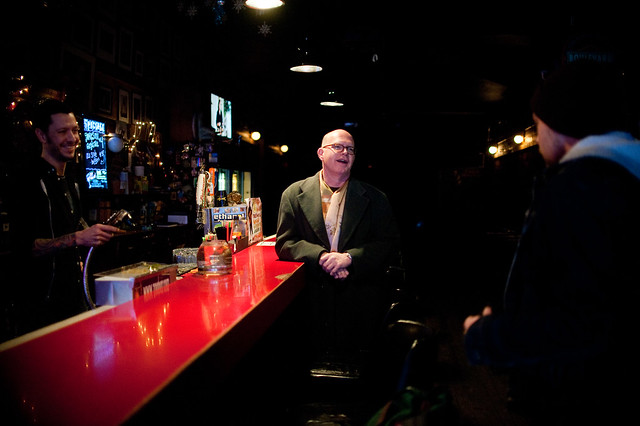
As a social pursuit, music has provided not only a common interest, but also a medium through which the Blazeks strengthen their relationships. Saber remembers his dad’s country records growing up — names like Webb Wilder and John Hyatt. He didn’t like it at the time. He listened to jazz into his preteens and then pop punk. Now, though, he’s developed an appreciation for Steve’s tastes.
“I’ve seen both those guys [Webb Wilder and John Hyatt] here [at the Zoo Bar]. They’re amazing musicians,” he says. “That was interesting, to grow up listening to them and not really appreciating them, only to grow up and listen to these songs and have memories of them being played around the house.”
If the Blazek men have a second home in Lincoln, the Zoo Bar might just be it. Recently, their relationship with the bar has culminated in Saber’s employment there. And when the two meet there for a photo on a sunny afternoon, they make the same jokes with the bartender. They sit and laugh like old friends.
It becomes less Saber and his dad or Fuzzy and his kid, and more two locals, sitting around for a drink.
Jacob Zlomke is Hear Nebraska’s editorial intern. His dad got him into Steve Miller Band and Styx. Reach him at jacobz@hearnebraska.org.




